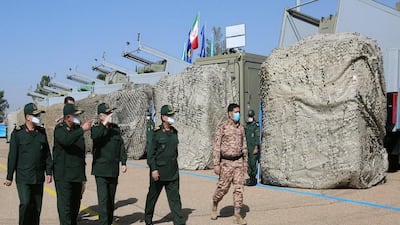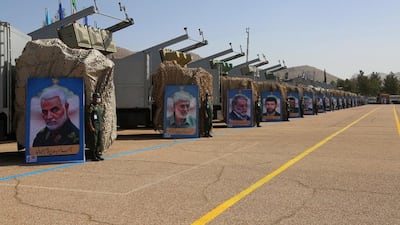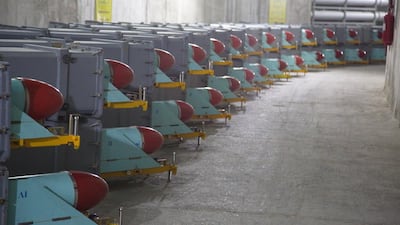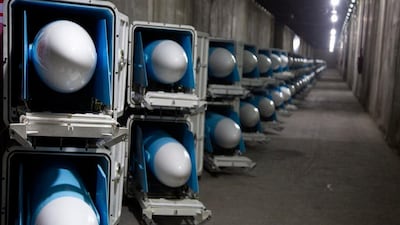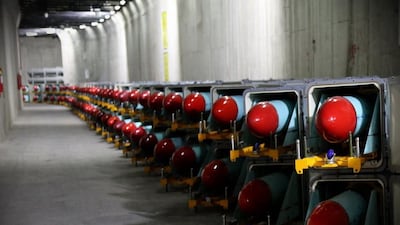Iran's promise of revenge for the Natanz nuclear sabotage incident on Sunday could risk serious escalation, but Tehran will probably seek to avoid casualties, analysts told The National after the latest in a string of incidents.
Any lethal response against Israel, which Iran blames for the sabotage, could cause a new crisis, they said.
Iran has so far said it will begin enriching uranium to 60 per cent purity in response to the attack, while maritime risk analysts at Dryad Global said an Israeli ship had been attacked in the Gulf of Oman on Tuesday evening.
The report could not be verified and the ship's owner, Ray Shipping, said the vessel had suffered no damage.
Natanz is Iran’s primary uranium enrichment facility, housing its advanced IR-9 centrifuges.
It was seriously damaged on Sunday when its power supply was destroyed by what Iran says was an explosive device.
It is thought that the attack set back Iran’s “breakout time” – the time required to enrich enough weapons-grade uranium for a nuclear bomb – by nine months.
Iran's next move
“In terms of a counter move, Iran has options in the Strait of Hormuz,” said Dean Mikkelsen, a cyber and maritime security analyst who has worked with oil companies in Iraq.
“Iran does repeat things – potentially a limpet mine attack again in the Arabian Sea, the confiscation of another ship in the Strait or near disputed islands,” he said.
“Cyber attacks are also possible. Iran and Israel have done tit-for-tat cyber attacks against each other in the past,” Mr Mikkelsen said.
Samuel Ramani, a commentator and Middle East specialist at the University of Oxford, agreed.
"Iran could respond with a cyber attack on Israel's water system. In that scenario, Israel [could] urge US officials to delay a swift return to the nuclear deal negotiations," he said.
Naval war
Iran was accused of placing limpet mines on the Israeli commercial vessel Helios Ray on February 28.
Israel was accused of retaliating by damaging Iran's "spy ship" the Saviz, in the busy Bab El Mandeb strait.
Neither side admitted to carrying out either incident.
Joe Truzman, an analyst with the Foundation for Defence of Democracies, said past Iranian actions showed calculated caution.
"They likely could have sunk the ships targeted in previous months, like the Helios. But they chose not to. Perhaps they don't want to get into a conflict with Israel because they've already estimated such an attack would spur the Israelis into retaliating strongly," he said.
In May 2018, Iranian operatives were blamed for firing missiles into Israel over the disputed Golan Heights.
Israel's retaliation in Syria produced some of the heaviest air strikes of the conflict.
"Iran knows that it can't afford to get itself into an all-out conflict with Israel under sanctions," Mr Truzman said.
But there are still unknowns, Mr Truzman said.
“Think of the embassy bombing in India ... it didn't do much but that's the type of attack I think keeps the Israelis worried.”
On January 29, a small explosive detonated near the Israeli embassy in New Delhi but there were no casualties. Indian media cited security officials who pointed the finger at Iran but, again, there was no confirmation.
Sima Shine, head of the Iran programme at Israel's Institute for National Security Studies, said Tehran's poor economic situation may hamper its ability to retaliate.
But, she said, this incident could still lead to escalation.
"If it's direct, vis-a-vis Israel, will there be any casualties? Because if that happens, probably Israel will retaliate, this can start a slippery slope of escalation between the two countries," Ms Shine said on Sunday.
Ms Shine was previously head of research at Israel's Mossad intelligence agency.
Nuclear deal moves
Israel’s supporters and others see the attack as an effort to weaken Iran’s hand and strengthen the US bargaining position at nuclear deal talks in Vienna, said Hussien Ibish, a senior resident scholar at the Arab Gulf States Institute in Washington.
"The recent attacks certainly delivered significant short-term damage to Iran's key nuclear facilities. I think we can expect Iran to certainly try to retaliate in some fashion soon," Mr Ibish said.
“The shadow war that has developed in a deniable 'grey zone' between Israel and Iran is clearly driven by regional competition and conflicts,” he said.
Despite this hostility, Mr Ibish believes that tensions between Tehran and Tel Aviv may come to an end “insofar as successful talks between the US and Iran would make the Iranian-Israeli shadow war unnecessary and undesirable. Otherwise, it’s going to continue, though it will intensify and ease, based on many factors”, he said.
"The current flare-up is strongly linked to the effort to renew talks between Washington and Tehran. Israel’s critics, especially Iran, accuse Israel of trying to sabotage negotiations, even though Iranian clients in Iraq, Yemen and elsewhere have also been on the attack recently," he said.
US President Joe Biden's administration seems determined to proceed with nuclear talks and will probably not take Israeli objections as seriously as former president Donald Trump did, the University of Oxford's Mr Ramani said.
The end result may “resemble the Mohsen Fakhrizadeh assassination", in which Israel was accused of shooting dead one of Iran's top nuclear scientists near Tehran in November last year.
The response "featured tensions and sabre-rattling but no real escalation of tensions, or change in Biden's views on renegotiating with Tehran”, Mr Ramani said.











